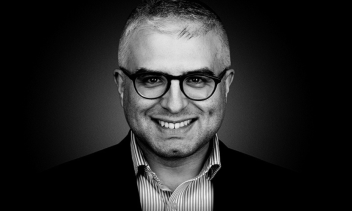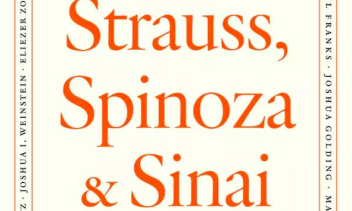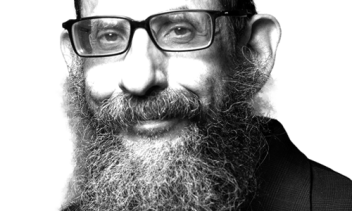Growing Up with Books
There are many reasons why I consider myself very lucky. But the top of the list is undoubtedly my parents. As I’ve said many times, I could put all of my teachers from every school and institution I have ever attended on one side of the scale and what I have learned from my parents would still outweigh them. Of course we have our quirks and dysfunctions like any other family, but there is one particular love they instilled in me that I am ever grateful for—a love of reading and learning. To this day, any Shabbos afternoon in my parents’ home my father sits in the living room with a Chumash or Gemara studying, while my mother is on the couch with a more eclectic mix—New Yorker articles, a Chumash, a book she checked out of the library (my mother was always close with our local librarians). I grew up surrounded by books. And that undoubtedly is why my love of books and reading endures today.
My first memory of reading is from before I could read. My mother would read to us next to the nightlight, which she affectionately called “the campfire.” She didn’t do the voices in the books but her intonation and emphasis gave books their narrative flavor. When I read to my own children, it is her voice that I am channeling. (“Well,” I can still hear her reading aloud, she has a distinct way of saying the word “well.”) And we went through the classics—Berenstain Bears, Miss Nelson is Missing!, and anything by Louis Sachar.
A while ago I shared my favorites book from when I was a kid on Twitter:
And as I grew up, my love of books grew with me. The first time I saw a grown up book, so to speak, was David McCullough’s biography of Harry Truman. My father was reading it during one of our family vacations at Loon Mountain in New Hampshire. I was in awe. The book felt like a mountain–it wasn’t something you read, but hiked. But soon enough, I learned not to be intimidated, no matter how formidable the size of the book.
So I began reading The Great Illustrated Classics, which were literary classics rewritten for a younger audience. There was a picture on each page, so that helped. I graduated to larger books–I read the novelization of the death of Superman. I started reading John Grisham and Michael Crichton. My fifth grade diorama was a scene from The Client—I buried a Lego man underneath a Lego boat.
So I figured, you know what, maybe the numbers were wildly off, but maybe I should start sharing my weekly Shabbos reads on Twitter.
In 2019, The Washington Post ran a lovely column entitled, “Books for Ages.” For each age, beginning at 1 and ending at 100, they recommended an age-appropriate book. I loved this thought experiment. I have always felt that I could trace my own self-development based on what was on my bookshelf. Later, I saw that My Jewish Learning developed a similar list with more of a Jewish focus. Their list went, as you’d expect for Jews, until the age of 120. I wrote a list of my own, but was only 34 when I wrote mine. I shared it on Twitter.
It’s not a perfect list, but it’s a start. Some books are in Hebrew, many I would probably replace. But it is a wonderful exercise that I suggest you try. Marking your own growth—whether by year, month or week—in books.
I Read This Over Shabbos
I was invited to join the Meaningful People Podcast soon after it launched. During our conversation they asked me how many books I have read in my lifetime. My response makes me cringe (this section begins at 8:45 into the interview).
I answered, “I am trying to do very very basic math. I don’t know 10 thousand? 5 thousand?” My nephew Ephraim, who actually is quite gifted in math, called me out on this. There’s no way I have read ten thousand books. He’s right. I am just very bad at math. But I always did try to read a book each Shabbos. So I figured, you know what, maybe the numbers were wildly off, but maybe I should start sharing my weekly Shabbos reads on Twitter. So I did.
I shared this lovely book:
I shared it rather innocently. It’s a fantastic book, readable, enjoyable, and you can totally finish it over a Shabbos. I didn’t plan on doing this every week. In fact, I forgot to share anything about what I read over Shabbos for almost 3 months.
Then I read a book I simply had to share. So I decided to pick it up again.
I shared a few follow up thoughts and questions and waited for the next Saturday night to share what I read. The next time, I was less wordy. I just wrote, “I read this over Shabbos.”
And so it began. I shared a book the next week. And the week after. And every week since.
It has been 64 books since I started posting and thank God it has caught on. That’s the best part. Others have begun to share as well and some of my favorite reads have come from other’s recommendations.
But, Did You Really Read This Over Shabbos?
Of course, as with any online trend, the “I Read This Over Shabbos,” community does have its fair share of doubters and jesters. We love both.
There’s the old “I redt this over Shabbos,” a pun based on the Yiddish word redt meaning matchmaking. People share pictures of their siddurim, cereal boxes, Febreze instructions, and just about anything that you can read. I love it. Part of building culture is making fun of it.
Still, there are some lingering questions.
Is this just a big flex? What is the point of posting what you read over Shabbos?
Some certainly tease that this is just some big flex. Like a peacock puffing its feathers.
I hear it. But that’s not what this is about.
People share all sorts of things on social media. Avocado sandwiches, flyers for programs, or vacation pictures. Sharing what you read has two goals:
(1) It reframes social media as a place to share ideas. People log on Saturday night and instead of arguing about politics, we share books, many of which relate to Jewish life and history.
(2) It reframes Shabbos. Instead of feeling restrictive or a day that can only be enjoyed by those fully observant, “I Read This Over Shabbos,” became a movement to see Shabbos as a day to connect with your favorite books—regardless of denomination or even religion.
It reminds me of that fantastic book I read as a kid, Drop Everything, It’s D.E.A.R. Time!
Shabbos becomes a time to D.E.A.R—drop everything and read.
Do you really finish a book every Shabbos?
What do you think? Of course not. I just say what I read, not what I finished. I usually finish the book over Sunday. Sometimes I continue reading throughout the week.
How do you pick what books to read?
I go through phases. I almost always read non-fiction. I love learning about new subjects. On Shabbos I try to read books that have some constructive Jewish angle, but I’m not so strict about what I read on Shabbos from a halachic point of view. But some have definitely raised that as an issue.
How do you remember what you read?
I forget as much as the next person. Two helpful tips.
-
I use book darts. They are these wonderful little markers that help me remember key passages/stories. When I have time I include the key passages I marked off in my thread which also helps me remember. Sharing ideas is a great way to remember them. Here are some of the longer threads I did that used book darts to help me remember the key parts: Scholem’s Sabbatai Sevi: The Mystical Messiah, Creating American Reform Judaism: Life and Times of Isaac Mayer Wise, and The Urge: Our History of Addiction.
- I organize my learning. I hope to write a separate piece just about my organization system, but I have a fairly elaborate system for how I organize what I read and learn. I wrote about my system here: Some Tips for Remembering What You Learn.
Letters vs. Numbers
We’ve discussed before why our site is called 18Forty. In short, it is after the calendric year. But why not call it 1840? Why do we have it stylized as both letters and numbers—18Forty?
It’s a good question with a mundane answer. 1840 was already registered, so we went with 18Forty. But now that we are 18Forty I actually think it is inadvertently profound.
Broadly speaking there always seem to be two ways to approach life’s questions: as numbers or letters. Numbers are sequential, even a fraction changed will totally transform the meaning. Letters, words, sentences, are more forgiving. Numbers is the language of math, letters is the language of art. I was always better with letters than numbers. Especially in school. I could bluff my way through a free form essay, but I still get anxiety from math tests. But we need both ways of thinking. Letters can express experience, numbers express objective truth. And on 18Forty, we try to integrate both forms. We speak with academics and regular folks. We have conversations and essays. Oftentimes we can have letter-like conversations, but to really plumb the depths of a subject you need the denser number-like tomes of academic works. At 18Forty, we combine language and numbers to approach subjects holistically. So hopefully, the stylized name works—even if it was not our original intention.
Where conversations end, books begin. And the end of every great book is another conversation.
Of course if you have any other questions, or comments feel free to reach out. We plan to begin sharing a lot more book related content on 18Forty starting this month—so stay tuned.
And don’t forget to share what you read on Shabbos!








